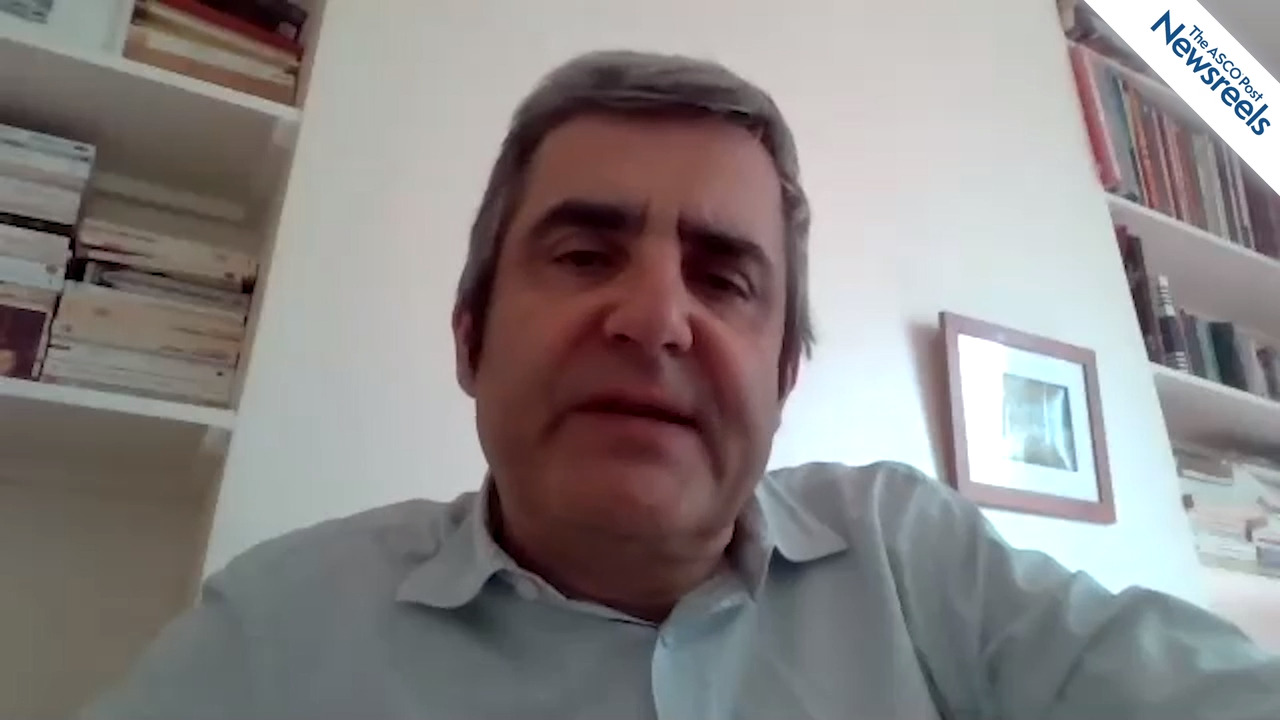Study Explores Adding Trastuzumab to Radiotherapy for Women With HER2-Positive DCIS
The addition of trastuzumab to radiotherapy did not reach the protocol objective of a 36% reduction in the ipsilateral breast tumor recurrence rate for women with HER2-positive ductal carcinoma in situ (DCIS) in the NRG Oncology clinical trial NSABP B-43. The trial did find a modest (19%) reduction ...
Nivolumab vs Bevacizumab in Recurrent Glioblastoma
As reported in JAMA Oncology by David A. Reardon, MD, and colleagues, the phase III CheckMate 143 trial showed no difference in overall survival among adult patients with a first recurrence of glioblastoma treated with nivolumab vs bevacizumab following standard radiation and temozolomide therapy. ...
Pembrolizumab, Trastuzumab, and Chemotherapy in HER2-Positive Metastatic Esophagogastric Cancer
In a single-center phase II trial reported in The Lancet Oncology, Janjigian et al found that the addition of pembrolizumab to trastuzumab and chemotherapy showed activity in the first-line treatment of HER2-positive metastatic esophagogastric cancer. Study Details The investigator-initiated trial...
Adjuvant Nivolumab/Ipilimumab or Nivolumab Alone vs Placebo in Patients With Resected Stage IV Melanoma
In an interim analysis of the German phase II IMMUNED study reported in The Lancet, Zimmer et al found that adjuvant therapy with nivolumab/ipilimumab or nivolumab alone significantly prolonged recurrence-free survival vs placebo in patients with resected stage IV melanoma and no evidence of...
Trastuzumab Deruxtecan vs Chemotherapy for Previously Treated Patients With HER2-Positive Advanced Gastric Cancer
Results of the phase II DESTINY-Gastric01 study—reported at the ASCO20 Virtual Scientific Program (Abstract 4513) and published in The New England Journal of Medicine, by Kohei Shitara, MD, of the National Cancer Center Hospital East, Kashiwa, and colleagues—found that the antibody-drug conjugate...
Does Treatment With Immune Checkpoint Inhibitors Cause Flare-ups in Patients With Preexisting IBD or Microscopic Colitis?
In a retrospective analysis reported in JCO Oncology Practice, Grover et al found that enterocolitis flares occurred in approximately one-quarter of patients with preexisting inflammatory bowel disease (IBD) or microscopic colitis who received immune checkpoint inhibitors for the treatment of solid ...
IMvigor130: First-Line Atezolizumab Plus Chemotherapy vs Chemotherapy Alone in Advanced Urothelial Cancer
As reported in The Lancet by Matthew D. Galsky, MD, of Icahn School of Medicine at Mount Sinai, and colleagues, the phase III IMvigor130 trial has shown prolonged progression-free survival with first-line atezolizumab plus platinum-based chemotherapy vs platinum-based chemotherapy alone in patients ...
Internationally Regarded Cancer Immunologist Did Not Stray Far From Home
Internationally recognized immune-oncology melanoma expert Jedd D. Wolchok, MD, PhD, FASCO, was born and reared in Staten Island, not far from where he would shape his noted career at Memorial Sloan Kettering Cancer Center (MSK) in New York, New York. “I went to Princeton University and, during my ...
Love of Science, Passion for Research, and Belief in the Power of the Immune System
Steven A. Rosenberg, MD, PhD, FASCO, knew from the start of his medical career that if treatments for cancer were to become curative, research in new therapies would have to move away from the mainstay one-size-fits-all approach of systemic chemotherapy to an innovative, personalized strategy that ...
Thierry André, MD, on Colorectal Cancer: Pembrolizumab vs Chemotherapy for Metastatic Disease
Thierry André, MD, of Hôpital Saint-Antoine, discusses the phase III results from KEYNOTE-177, which showed that, compared with standard chemotherapy of FOLFOX or FOLFIRI, pembrolizumab doubled median progression-free survival, from 8.2 months to 16.5 months, in patients with microsatellite instability–high/mismatch repair–deficient metastatic colorectal cancer (Abstract LBA4).
Durvalumab Added to Standard Chemotherapy Improved Overall Survival in Patients With Malignant Pleural Mesothelioma
Data from clinical efficacy and biomarker analyses conducted for the single-arm phase II PrE0505 study of the initial treatment of patients with malignant pleural mesothelioma were presented by Patrick Forde, MB, BCh, and colleagues during the Lung Cancer Oral Abstract Session at the ASCO20 Virtual ...
Richard L. Schilsky, MD, on This Year’s Practice-Changing Findings
Richard L. Schilsky, MD, Chief Medical Officer of ASCO, talks about some of the most important and practice-changing findings presented this year at the ASCO20 Virtual Scientific Program, including the use of targeted and immunotherapies in earlier lines of therapy, where they have made a significant impact.
Scott Kopetz, MD, PhD, on Colorectal Cancer: Encorafenib Plus Cetuximab With or Without Binimetinib
Scott Kopetz, MD, PhD, of The University of Texas MD Anderson Cancer Center, discusses phase III results of the BEACON CRC study, which confirmed that, compared with standard chemotherapy, encorafenib plus cetuximab with or without binimetinib improved overall survival and objective response rate in previously treated patients with BRAF V600E–mutated metastatic colorectal cancer (Abstract 4001).
FDA Approves First-Line Ramucirumab Plus Erlotinib for Metastatic EGFR-Mutated NSCLC
On May 29, the U.S. Food and Drug Administration (FDA) approved ramucirumab (Cyramza, injection, 10 mg/mL solution) in combination with erlotinib for the first-line treatment of patients with metastatic non–small cell lung cancer (NSCLC) with epidermal growth factor receptor (EGFR) exon 19...
FDA Approves Atezolizumab Plus Bevacizumab for Patients With Unresectable or Metastatic HCC
On May 29, the U.S. Food and Drug Administration (FDA) approved atezolizumab (Tecentriq) in combination with bevacizumab (Avastin) for the treatment of people with unresectable or metastatic hepatocellular carcinoma (HCC) who have not received prior systemic therapy. The review of this application...
First-Line Pembrolizumab Plus Etoposide/Platinum for Extensive-Stage Small Cell Lung Cancer
As reported at the ASCO20 Virtual Scientific Program by Charles M. Rudin, MD, PhD, and colleagues (Abstract 9001), the phase III KEYNOTE-604 trial has shown that first-line pembrolizumab plus etoposide/platinum significantly prolonged progression-free survival and prolonged overall survival at a...
TROPHIMMUN Trial Finds Avelumab Effective in Rare Gynecologic Tumor Resistant to Chemotherapy
The first trial of immunotherapy for gestational trophoblastic tumors proved effective in almost 50% of patients resistant to single-agent chemotherapy, French investigators reported in an abstract presented during the ASCO20 Virtual Scientific Program.1 The results of the phase II TROPHIMMUN trial ...
Christopher Sweeney, MBBS, and Thomas Powles, MD, PhD, on Urothelial Cancer: The JAVELIN Bladder 100 Study on Avelumab vs Best Supportive Care
Christopher Sweeney, MBBS, of Dana-Farber Cancer Institute, talks with Thomas Powles, MD, PhD, of Queen Mary University of London, about the first study to demonstrate a survival advantage with avelumab for metastatic urothelial cancer. In the trial, avelumab improved median overall survival by 21.4 months compared with 14.3 months with best supportive care (Abstract LBA1).
Expert Point of View: Axel Grothey, MD
Sharing his perspective on KEYNOTE-177 with The ASCO Post was Axel Grothey, MD, Director of GI Cancer Research at the West Cancer Center, OneOncology, Memphis. “This is a very important, highly anticipated study,” he said. “It’s the first randomized trial of any checkpoint inhibitor in...
Pembrolizumab Doubles Progression-Free Survival in MSI-H/dMMR Metastatic Colorectal Cancer
For the first time, upfront treatment with immunotherapy has improved—in fact, doubled—median progression-free survival in a subset of patients with metastatic colorectal cancer. The findings are from the interim analysis of the randomized open-label phase III KEYNOTE-177 trial comparing the...
Expert Point of View: Jonathan E. Rosenberg, MD
“These data are solid, showing a 7-month improvement in overall survival in patients with stable disease or better after first-line chemotherapy. This is roughly a 50% improvement in survival, which is clinically meaningful. Also, progression-free survival was significantly increased with...
Maintenance Avelumab Improves Survival in Advanced Bladder Cancer
Maintenance therapy with avelumab and best supportive care significantly prolonged overall survival vs best supportive care alone in patients with advanced urothelial carcinoma that did not progress on first-line platinum-based chemotherapy, according to an interim analysis of the phase III...
ESMO Breast 2020: Novel Biomarkers May Predict Immunotherapy Benefit in Metastatic Breast Cancer
Two novel biomarkers have been found to correlate with improved outcomes with immunotherapy in metastatic breast cancer and may help to identify the patients most likely to benefit from this treatment, according to exploratory studies reported at the European Society for Medical Oncology (ESMO)...
ESMO Breast 2020: Patient Preference for Subcutaneous vs Intravenous Pertuzumab/Trastuzumab for HER2-Positive Early Breast Cancer
At the European Society for Medical Oncology (ESMO) Breast Cancer Virtual Meeting 2020, Joyce O’Shaughnessy, MD, of Baylor University Medical Center, reported results from an interim analysis of the PHranceSCa study (Abstract 80O). The study investigators found that over 80% of patients preferred...
FDA Approves Nivolumab/Ipilimumab Plus Chemotherapy for First-Line Treatment of Metastatic or Recurrent NSCLC
On May 26, the U.S. Food and Drug Administration (FDA) approved the combination of nivolumab (Opdivo) plus ipilimumab (Yervoy) and two cycles of platinum-doublet chemotherapy as first-line treatment for patients with metastatic or recurrent non–small cell lung cancer (NSCLC) with no epidermal...
Roswell Park Investigators Study Immunotherapy Combination in Patients With Cancer Infected With COVID-19
A clinical trial investigating a two-drug immunotherapy combination will soon be available to patients with cancer infected with COVID-19 at Roswell Park Comprehensive Cancer Center in Buffalo. The U.S. Food and Drug Administration (FDA) has authorized clinical researchers at the center to conduct...
Expert Point of View: Pamela N. Munster, MD
Formal I-SPY 2 trial discussant, Pamela N. Munster, MD, Professor in the Department of Medicine, University of California, San Francisco, found the study promising but said confirmatory trials are needed. “What we know so far in preoperative therapy for breast cancer is that pathologic complete...
Metastatic Urothelial Cancer: A Conversation on State-of-the-Art Treatment Before the ASCO20 Virtual Scientific Program
As Thomas Powles, MD, PhD, of Queen Mary University of London, prepares to deliver his late-breaking presentation at the ASCO20 Virtual Scientific Program (LBA-1), he talks with Christopher Sweeney, MBBS, of Dana-Farber Cancer Institute, about current therapy: PD1/PDL1 inhibition in second-line treatment and as monotherapy in the first-line setting, as well as the concept of maintenance switch.
Neoadjuvant Atezolizumab Plus Chemotherapy for Resectable NSCLC
In a phase II study reported in The Lancet Oncology, Shu et al found that neoadjuvant treatment with atezolizumab plus nab-paclitaxel/carboplatin produced a major pathologic response in 57% of patients and a complete pathologic response in 33% of patients with resectable, predominantly stage IIIA...
Atezolizumab Plus Bevacizumab vs Sorafenib in Treatment-Naive Patients With Unresectable Hepatocellular Carcinoma
As reported in The New England Journal of Medicine by Richard S. Finn, MD, and colleagues, the phase III IMbrave150 trial has shown that anti–programmed cell death ligand 1 (PD-L1) plus anti-VEGF therapy with atezolizumab plus bevacizumab improved progression-free and overall survival vs sorafenib ...
FDA Approves Atezolizumab for the First-Line Treatment of Patients With Metastatic NSCLC and High PD-L1 Expression
On May 18, the U.S. Food and Drug Administration (FDA) approved atezolizumab (Tecentriq) for the first-line treatment of adult patients with metastatic non–small cell lung cancer (NSCLC) whose tumors have high programmed cell death ligand 1 (PD-L1) expression (PD-L1 stained ≥ 50% of tumor cells or...
Qi Liu, PhD, on NSCLC: Pneumonitis, Immunotherapy, and Chemotherapy
Qi Liu, PhD, of the U.S. Food and Drug Administration, discusses data that suggest that patients with advanced non–small cell lung cancer who had a past medical history of pneumonitis were more likely to experience treatment-associated pneumonitis in response to immune checkpoint inhibitors or chemotherapy (Abstract CT086).
FDA Pipeline: Two Breakthrough Therapy Designations for Fam-Trastuzumab Deruxtecan-nxki, and More
Over the past few weeks, the U.S. Food and Drug Administration (FDA) has granted Breakthrough Therapy designations for an antibody-drug conjugate in the treatment of gastric and lung cancers. The Agency has also issued Orphan Drug designations for agents being investigated in chronic myeloid...
FDA Approves Nivolumab/Ipilimumab for First-Line Treatment of Patients With Metastatic NSCLC and PD-L1 Tumor Expression ≥ 1%
On May 15, 2020, the U.S. Food and Drug Administration (FDA) approved the combination of nivolumab (Opdivo) plus ipilimumab (Yervoy) as first-line treatment for patients with metastatic non–small cell lung cancer (NSCLC) whose tumors express programmed cell death ligand 1 (PD-L1) at ≥ 1%, as...
Combining Pembrolizumab With IL-12 Electroporation May Improve Clinical Response in Patients With Immunologically 'Cold' Melanoma
Patients with non–immune-infiltrated “cold” tumors have low frequencies of intratumoral tumor-reactive, checkpoint-positive cytotoxic lymphocytes, making them less responsive to checkpoint blockage than patients with immune-infiltrated “hot” tumors. A phase II study by Alain P. Algazi, MD, and...
First-Line Concomitant and Sequential Nivolumab/AVD for Early-Stage Unfavorable Classical Hodgkin Lymphoma
In a phase II German Hodgkin Study Group trial (NIVAHL) reported in JAMA Oncology, Bröckelmann et al found that both concomitant and sequential nivolumab plus AVD (doxorubicin, vinblastine, and dacarbazine) regimens showed efficacy in first-line treatment of early-stage unfavorable classical...
Edward B. Garon, MD, on NSCLC: Long-Term Use of Pemetrexed Plus Platinum With Pembrolizumab
Edward B. Garon, MD, of the University of California, Los Angeles David Geffen School of Medicine, discusses KEYNOTE-189 trial findings that showed adding pembrolizumab to pemetrexed plus platinum—which previously was found to improve overall and progression-free survival—is also safe and has manageable toxicity in long-term use for patients with metastatic nonsquamous non–small cell lung cancer (Abstract CT085).
Spartalizumab for Locally Advanced or Metastatic Anaplastic Thyroid Carcinoma
In a phase II study reported in the Journal of Clinical Oncology, Jaume Capdevila, MD, and colleagues found that the programmed cell death protein 1 (PD-1) inhibitor spartalizumab produced responses in a cohort of patients with locally advanced or metastatic anaplastic thyroid carcinoma, with all...
Byoung Chul Cho, MD, PhD, on NSCLC: Genetic Mutations and Immunotherapy vs Chemotherapy in KEYNOTE-042
Byoung Chul Cho, MD, PhD, of Yonsei Cancer Center and Severance Hospital, discusses the STK11 and KEAP1 mutations in non–small cell lung cancers, and their relationship to the efficacy of pembrolizumab monotherapy vs platinum-based chemotherapy as first-line treatment for PD-L1–positive advanced disease (Abstract CT084).
Durvalumab Plus Chemotherapy for Extensive-Stage Small Cell Lung Cancer
On March 27, 2020, durvalumab (Imfinzi) was approved for use in combination with etoposide and either carboplatin or cisplatin as first-line treatment of patients with extensive-stage small cell lung cancer.1,2 Supporting Efficacy Data Approval was based on the findings of the open-label phase III ...
Encorafenib Combined With Cetuximab in Previously Treated BRAF V600E–Mutant Metastatic Colorectal Cancer
On April 8, 2020, encorafenib was approved for use in combination with cetuximab for the treatment of previously treated adult patients with metastatic colorectal cancer with a BRAF V600E mutation detected by a U.S. Food and Drug Administration (FDA)-approved test.1,2 Encorafenib is not indicated...
Highlights From ASH 2019 Included New Data in Leukemia, Lymphoma, Myeloma, and Myelodysplastic Syndromes
The 2019 American Society of Hematology (ASH) Annual Meeting & Exposition featured a cornucopia of sessions. It was impossible to attend all the lectures, symposia, oral presentations, poster presentations, and special events because many were concurrent. Below, we have selected some...
Pooled Analysis Supports Benefit of Dual HER2-Targeted Therapy, but Questions Remain
In the treatment of HER2-positive early breast cancer, patients who receive dual HER2-targeted therapy in both the neoadjuvant and adjuvant settings are less likely to experience recurrence than those who received dual therapy only as neoadjuvant treatment, according to a pooled analysis of...
KEYNOTE-522: A Biomarker Resource for PD-1 Inhibition in Early Triple-Negative Breast Cancer
In the phase III KEYNOTE-522 trial reported in The New England Journal of Medicine and reviewed in this issue of The ASCO Post, Schmid et al1 found that the addition of pembrolizumab to neoadjuvant chemotherapy in stage II or III triple-negative breast cancer significantly improved the pathologic...
Neoadjuvant and Adjuvant Pembrolizumab Improves Outcomes in Early Triple-Negative Breast Cancer
As reported in The New England Journal of Medicine by Peter Schmid, MD, PhD, of Barts Cancer Institute, Queen Mary University of London, and colleagues, analyses in the phase III KEYNOTE-522 trial have shown that the addition of pembrolizumab to neoadjuvant chemotherapy and the use of adjuvant...
Expert Point of View: Basem M. William, MD, MRCP (UK), FACP, and Caron Jacobson, MD
Basem M. William, MD, MRCP (UK), FACP, Director of the T-Cell Lymphoma Program and Member of the Blood and Marrow Transplant Program at The Ohio State University Comprehensive Cancer Center, Columbus, said many of the new-generation bispecific antibodies are “highly promising.” He said they “are...
Bispecific Antibodies Poised to Impact Treatment of Lymphoma and Other Blood Cancers
Studies of second-generation bispecific antibodies were among the highlights of the 2019 American Society of Hematology (ASH) Annual Meeting & Exposition. The bispecific T-cell engager blinatumomab was the first such agent to be approved by the U.S. Food and Drug Administration (FDA) in...
Addition of Pembrolizumab to Docetaxel for Previously Treated Immunotherapy-Naive Patients With Advanced Lung Cancer
In the single-institution phase II PROLUNG trial reported in JAMA Oncology, Oscar Arrieta, MD, and Christian Rolfo, MD, PhD, and colleagues found that the addition of pembrolizumab to docetaxel improved objective response rates and progression-free survival in immunotherapy-naive patients with...
Expert Point of View: Omid Hamid, MD
Omid Hamid, MD, Chief of Research/Immuno-Oncology, The Angeles Clinic & Research Institute, and Co-Director of the Cutaneous Malignancy Program at Cedars-Sinai Cancer Center, Los Angeles, commented on these two studies for The ASCO Post. According to Dr. Hamid, the findings for the tumor...
Novel Treatment Strategies Under Study in Advanced Melanoma
Several novel strategies for the treatment of patients with stage III or IV melanoma showed promise in studies presented at the 2020 ASCO-SITC Clinical Immuno-Oncology Symposium.1,2 Vaccine for High-Risk Patients After Resection A tumor lysate, particle-loaded, dendritic cell (TLPLDC) vaccine was...








